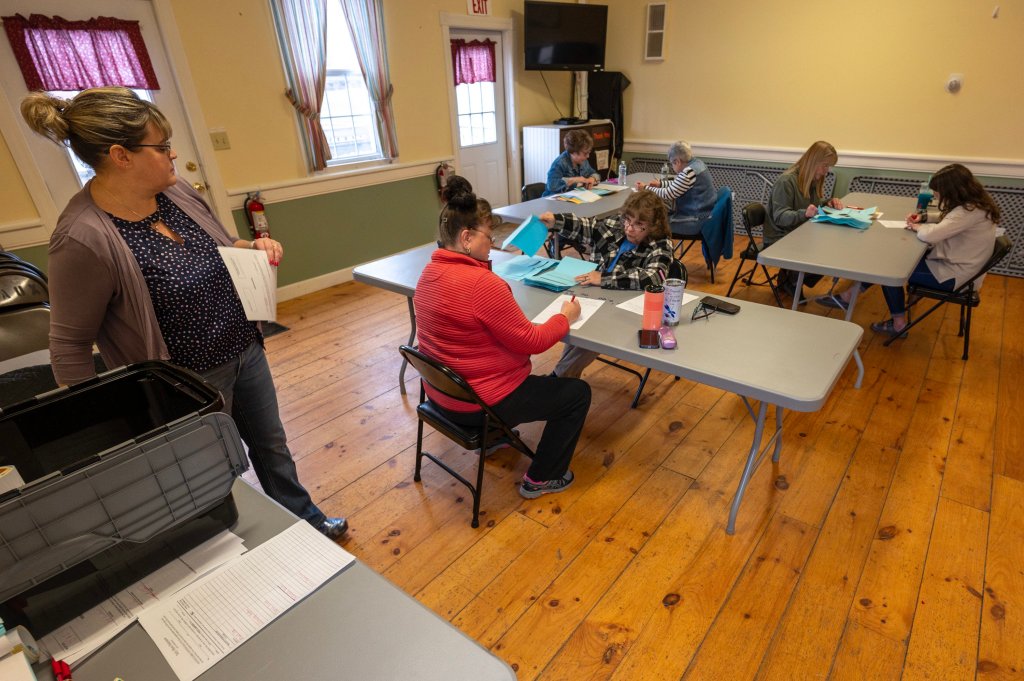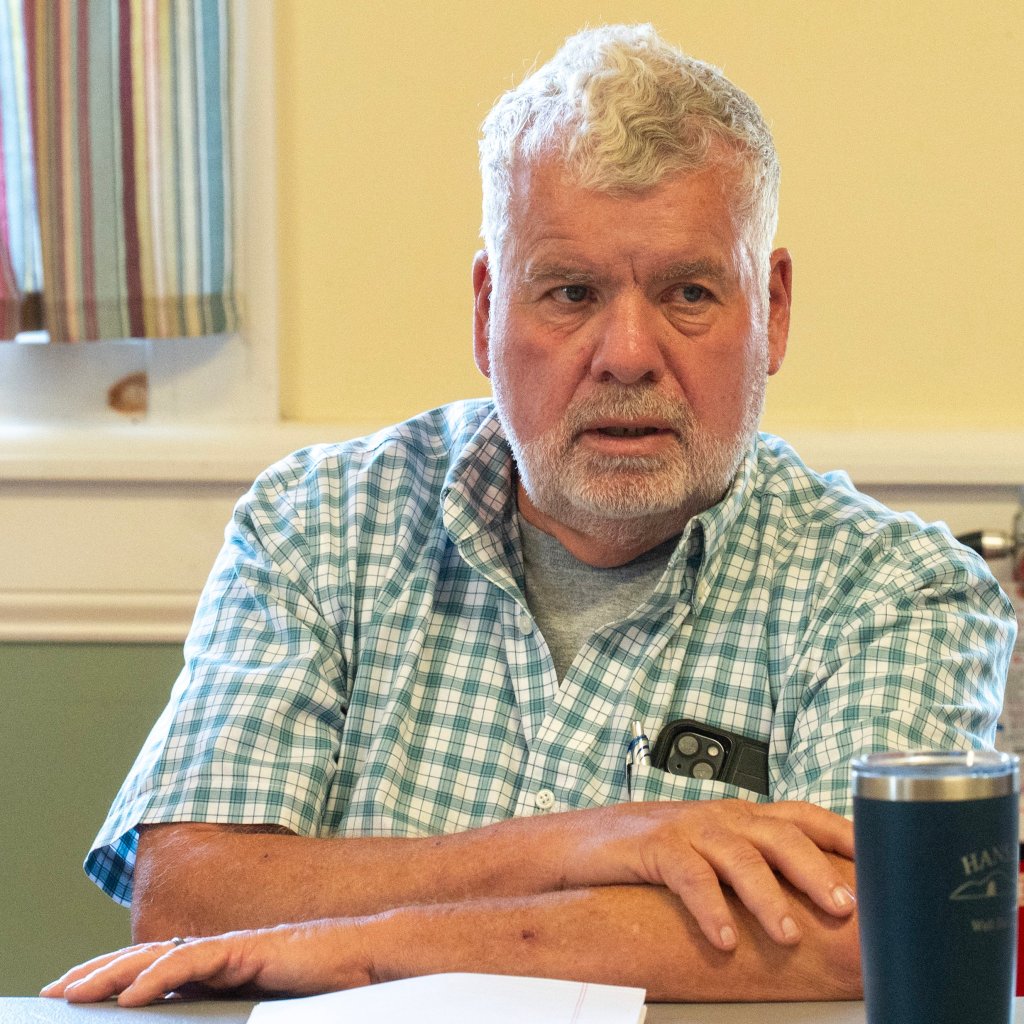West Gardiner’s town clerk, Angela Phillis, violated Maine law during the April 12 election when she served as the registrar of voters while also being employed part-time by one of the candidates for Select Board.
But enforcement of that state law, which disqualifies employees of candidates from handling voter registration-related activities, is entirely up to the town when it comes to elections for Select Board. State regulators have no control over how local elections are administered, leaving town officials to enforce the law — or not.
In West Gardiner, Select Board members learned of Phillis’ outside employment about a month before the April election but did not remove her as registrar of voters.
The lack of state-level enforcement of election laws, experts say, places more responsibility on residents to scrutinize their local elections and hold their leaders accountable.
‘IF I’D KNOWN’
Phillis, who has served as West Gardiner’s town clerk and registrar of voters since 2014, was hired in March as a part-time receptionist by then-Select Board candidate Steve McGee at his construction company, McGee Construction. McGee had previously served one term on the board from 2020-23: he was defeated in a reelection bid by Gary Hickey II.

Under state law, Phillis’ hiring at McGee Construction disqualified her from serving as the town’s registrar of voters — a position that evaluates voter eligibility at the polls, processes new voter applications and maintains a list of all registered voters. State law says an election registrar “may not be an employee of a party or candidate.”
Along with her duties as town clerk and registrar of voters, Phillis also holds positions in West Gardiner as the administrator to the Select Board, assistant treasurer and assistant tax collector. She’s still employed at McGee Construction, too.
Phillis said she did not consider that her hiring by a candidate would raise concerns over conflict of interest. She said McGee and his wife have been her friends for years.
“My town job is one job, that job is another job,” she said. “I don’t intermix (the) two jobs. For me personally, I don’t bring town business to there, and I don’t bring their their business to the town.”
She said she only learned that she may have violated state law when Heidi Peckham, Maine’s director of elections and voter registration, called her Aug. 13 to inform her that she should not have remained registrar during the April election.
Phillis said she has not undergone elections training since she was hired in 2014 — a gap that she said likely contributed to her not knowing about the law.
During an Aug. 7 public forum, Select Board Chairman Greg Couture also said he had no knowledge of any conflict of interest or violation of state law. Phillis did not attend the forum; she said she was working in the town office.

“I didn’t know that one of the town employees was working in an outside job,” Couture said during the forum. “It was never anything that was brought up or anything discussed, so I didn’t know that. If I’d known that, then that person would not have been in charge of the counting of the ballots or anything else. They would have been — just like if they were running for the position — they wouldn’t be able to be involved in it.”
But Hickey said during the forum that he had raised concerns about Phillis’ hiring by McGee to the two other Select Board members in their March 13 meeting — a month before the April 12 election.
He said he read the relevant statute to the other board members and said he was worried that law-breaking activity was “getting swept under the rug.”
“The feedback I got from that was, ‘If you can’t trust your own people, then who can you trust?'” Hickey said Wednesday.
McGee won the April election by a 31-vote margin over Christopher McLaughlin. His term ends in 2028.

Neither McGee nor Couture responded to requests for comment.
WHO ENFORCES THE LAW?
While the disqualifications for election registrars come from a state law, the Secretary of State — the executive office that oversees elections in Maine — has no power to enforce it in local elections. In a state or federal election, the Secretary of State may be able to jump in, but local-only elections are the purview of the municipality.
Maine state law grants municipalities wide powers to design and run their own elections, said Robert Glover, associate professor of political science and honors at the University of Maine. The state’s constitution also grants towns and cities “home rule” powers, allowing local governments to govern themselves however they wish, unless it runs afoul of state and federal law.
But local enforcement of Maine’s election laws isn’t often necessary, given that conflicts of interest like this are “really rare,” Glover said.
Maine’s local elections are generally well-run, he said, and civic engagement at the local level prevents many violations before they happen.
“Town clerks, election clerks, election officials generally try to avoid even the appearance of a conflict of interest,” Glover said. “So, what stands out about this one is that it’s a pretty clear conflict of interest.”
While Phillis would still be eligible to serve as a registrar of voters in future elections — as long as McGee is not a candidate — Glover said the lack of local enforcement can cause concerns about election integrity to bubble on a local level.
That’s not necessarily a bad thing, he said. Residents, he said, should demand accountability from their local officials and carry on Maine’s tradition of resident involvement in town affairs.
“It’s really the responsibility of the people who live in West Gardiner to place pressure on the local municipality to say, ‘What are we going to do to resolve this issue?'” Glover said.
Several residents at the July public forum said they were frustrated with West Gardiner’s lack of transparency and failure to remove Phillis from her role as registrar — especially given that Hickey informed the other board members of the violation about a month before the election.
“I do find it a little bit incredulous that you were not aware that (Phillis) was working for (McGee) well before the election,” West Gardiner resident Andrea Lenhart said during the forum. “See it from my point of view — you work very closely. She’s your closest assistant on the board.”
Hickey said he wished the issue were taken more seriously when he brought up Phillis’ hiring in March.

If West Gardiner residents knew before the election, they would have been pushed back earlier, he said.
“I mean, it’s state law,” Hickey said. “That stuff needs to be taken serious. That would have been, been the best way to process that, is just to say, ‘Oh, wow, yeah, this is the law. We should follow that law.'”
